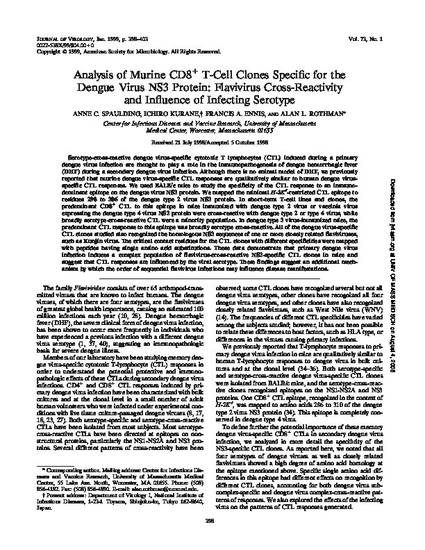
Serotype-cross-reactive dengue virus-specific cytotoxic T lymphocytes (CTL) induced during a primary dengue virus infection are thought to play a role in the immunopathogenesis of dengue hemorrhagic fever (DHF) during a secondary dengue virus infection. Although there is no animal model of DHF, we previously reported that murine dengue virus-specific CTL responses are qualitatively similar to human dengue virus-specific CTL responses. We used BALB/c mice to study the specificity of the CTL response to an immunodominant epitope on the dengue virus NS3 protein. We mapped the minimal H-2Kd-restricted CTL epitope to residues 298 to 306 of the dengue type 2 virus NS3 protein. In short-term T-cell lines and clones, the predominant CD8(+) CTL to this epitope in mice immunized with dengue type 2 virus or vaccinia virus expressing the dengue type 4 virus NS3 protein were cross-reactive with dengue type 2 or type 4 virus, while broadly serotype-cross-reactive CTL were a minority population. In dengue type 3 virus-immunized mice, the predominant CTL response to this epitope was broadly serotype cross-reactive. All of the dengue virus-specific CTL clones studied also recognized the homologous NS3 sequences of one or more closely related flaviviruses, such as Kunjin virus. The critical contact residues for the CTL clones with different specificities were mapped with peptides having single amino acid substitutions. These data demonstrate that primary dengue virus infection induces a complex population of flavivirus-cross-reactive NS3-specific CTL clones in mice and suggest that CTL responses are influenced by the viral serotype. These findings suggest an additional mechanism by which the order of sequential flavivirus infections may influence disease manifestations.
Available at: http://works.bepress.com/alan_rothman/30/